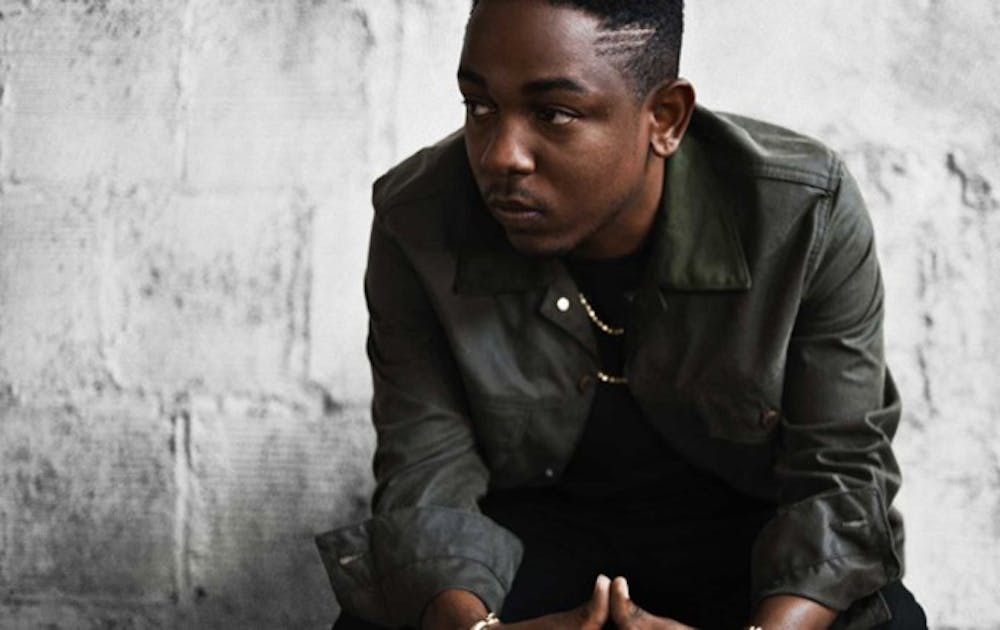On Overly Dedicated, Kendrick Lamar’s 2010 mixtape that caught the attention of his current mentor Dr. Dre, he admits, “The hardest thing for me to do/ is to get you, to know me, within sixteen bars.” With Section.80, his first independent album, Kendrick teased many possibilities of representation: a dutiful observer of his generation’s pitfalls, an empathetic poet reciting character studies, a Black Panther Party revivalist, etc. On good kid, m.A.A.d. city, he extends himself to inhabit an identity bigger than any one person—Compton. Structured as a concept album that uses the city as a physical and emotional roadmap to navigate Kendrick’s past, good kid answers the question of who Kendrick is with where he’s from, uniting the two in a fascinating, undaunted narrative.
The storyline of good kid, which spans a day in the life of a 10th-grade Kendrick in Compton, is deceptively simple. He borrows his mother’s van so he can meet up with a girl named Sherane, but abandons the van to ride around with his friends. The tracks are punctuated with voicemails from Kendrick’s mother and conversations with his friends. The tactic allows Kendrick to rap about what he knows, to confuse the boundaries between life and art. As the day unfolds, so too does Kendrick’s complex history. On “Backstreet Freestyle,” Kendrick begins to improvise over a CD his friend Ali brings. Working with one of the fiercest beats I’ve heard to date, Kendrick raps, “I pray my dick get big as the Eiffel Tower/ So I can f**k the world for 72 hours.” The hook is unpolished—he’s channeling how he rapped at 16—and it makes Kendrick sound brash, confident and starry-eyed. As the track builds, Kendrick, who had been rapping as if hiding a cocky grin, starts to growl, sounding older and more cynical.
The next track, “The Art of Peer Pressure,” is equally menacing. Staged around a failed robbery and subsequent police chase, the hook reiterates different ways Kendrick conforms, such as, “Rush a n***a quick and then laugh about it/ that’s ironic ‘cause I’ve never been violent, until I’m with the homies.”
The struggle between living out the expectations of the city and Kendrick’s hunger for individual rebellion stays at the heart of the album and its title. Meaning both “My Angry Adolescence Divided” and “My Angel’s on Angel Dust,” the acronyms address the constant tension of morality in an environment bent on corruption. On “Good Kid,” a brooding Pharrell-backed track, Kendrick outlines the choices that await him in Compton: “But what am I supposed to do/ When the topic is red or blue/ And you understand that I ain’t/ But I know I’m accustomed to.” As the song progresses, his attempts to resist gang affiliations weaken, and the corresponding track, “m.A.A.d. city,” chronicles his descent into a subculture of violence. Intensified by Kendrick’s urgent delivery, Compton itself begins to emerge as towering force that uses K.Dot as its personal punching bag. It saddles him with dangerous vendettas (“You killed my cousin in ‘94, f**k yo truce”) and premature lessons (“And they wonder why I rarely smoke now/ Imagine if your first blunt had you foaming at the mouth”). In perhaps the most heartbreaking line on the entire LP, Kendrick christens himself “Compton’s human sacrifice.”
After a barrage of lyrical jabs and hooks, good kid offers a welcome break from a sobering reality. The track equivalent of a cold beer after a long day, “Swimming Pools (Drank)” picks up where Section.80’s “A.D.H.D.” left off, reporting on our generation’s desire to drown our dissatisfaction in drug culture. What differentiates Kendrick from other rappers, especially those who are as attuned to such issues, is his humility when it comes to remedying the issues he raps about. He doesn’t condemn or judge—he is simply the truth-teller. It’s precisely why “Swimming Pools” has become his greatest commercial success to date. In addition to its slick, trance-like production and hypnotic hook, “Swimming Pools” presents a shared reality that, however depraved, exists.
Yet no track speaks more about Kendrick’s truth than “Sing About Me, I’m Dying of Thirst,” a 2-part, 12-minute saga that situates him alongside Nas and Tupac as one of hip-hop’s most gifted storytellers. After he adopts a triad of perspectives that explore the trappings of Compton—living in constant fear for his life, turning to prostitution and his own self-doubt—he needs to be cleansed.
Yet does Kendrick even want to be redeemed? The album is an endless war of him vs. his environment, but he can’t entirely discount its allure. On “Money Trees,” he sings, “Money trees is the perfect place for shade and that’s just how I feel.” He unapologetically acknowledges a lifestyle that he wants, with Jay Rock adding, “What else is a thug to do when you eating cheese from the government?” (Incidentally, my only complaint about the album is the absence of the other Black Hippy members Schoolboy Q and Ab-Soul, while Drake’s insipid ass somehow makes a cameo.)
That’s a lifestyle reiterated by a Young Jeezy line Kendrick and his friends quote in one of the album’s skits: “Last time I checked I was the man on these streets.” But the album does not end with a positive affirmation for hustling. Instead, the most conclusive lesson learned comes in “Real,” where Kendrick says, “You love your hood, you might even love it to death/ But what’s love got to do with it when you don’t love yourself?” After a 68-minute long journey, he is still full of questions, ones he obviously grapples with even now. What’s refreshing is that Kendrick doesn’t provide answers on how to live, he provides answers for how he lives. Good kid, m.A.A.d. city doesn’t set out to be anyone’s gospel, but by presenting such a vulnerable, honest story in the face of hip-hop’s ongoing swagger war, Kendrick may as well be rapping behind a pulpit.
Get The Chronicle straight to your inbox
Sign up for our weekly newsletter. Cancel at any time.

